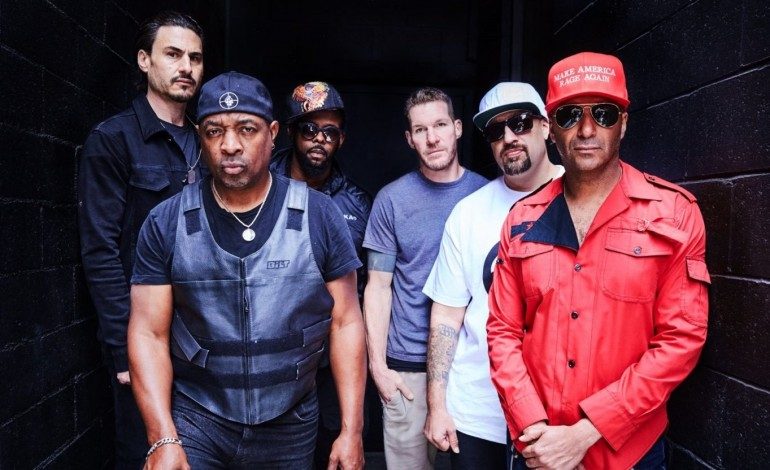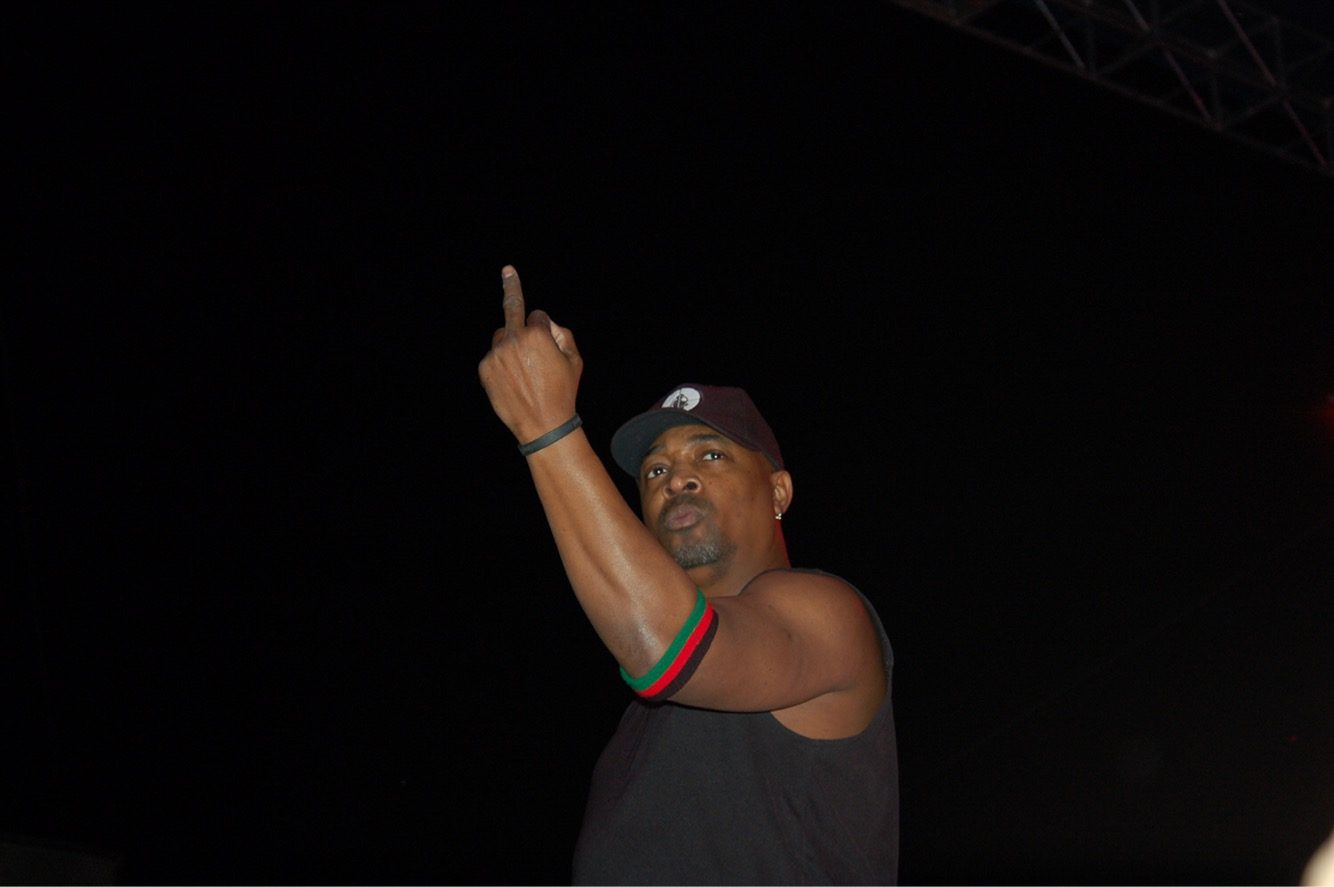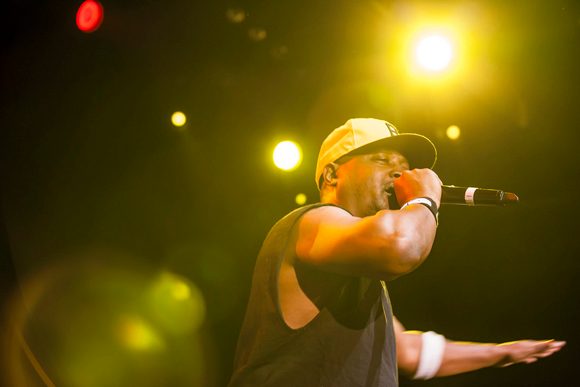

When Donald Trump swept into the White House following an unexpected wave of populism, most pundits were shocked. However, at his “age and stage,” Chuck D of Prophets of Rage is “not surprised about anything.” Concurrent with the historic presidential campaign and election of 2016, he had joined three members of Rage Against the Machine along with B-Real of Cypress Hill and his fellow Public Enemy member DJ Lord, touring the country and releasing an EP titled The Party’s Over. Chuck D joined the group knowing it would be a long-term gig and doesn’t plan on easing up.
The band has continued on with the announcement of their self-titled debut album, which will be released at the end of this week on September 15, 2017. Prophets also includes guitarist Tom Morello, bassist Tim Commerford and drummer Brad Wilk. Every member is vocal about politics, but Chuck D might be the most outspoken of the bunch, and he took the time to speak with us about how resentment has been festering in the United States before the Trump campaign, the shortcomings of today’s media and why “Hail to the Thief” warns us to keep a close eye on Vice President Mike Pence.
mxdwn: You were touring the country as this wave of populism saw Trump shock the world and win the presidential election. Considering you saw so much of the country during the run-up, was his victory as shocking for you as it was for the rest of the world?
Chuck D: Well at my age and stage I’m not surprised about anything. I could see that a lot of stuff was developing, especially after the Hilary Clinton/Bernie Sanders fiasco — if anything was left to happen it did. The crowds that we played in front of were [already] converted. You weren’t going to get anybody that was anti what we’re about coming to the concerts. But I mean you’d be a fool not to pay attention to what was going on in the parts of the country that don’t get much coverage by the media. That attitude was festering even during the Obama Administration. It was already close even in the Obama victory. You would have to be naïve and an idiot to not know that was a possibility.
mxdwn: Once Trump won and began rolling out his administrative agenda, did you feel a greater need to continue working with Prophets of Rage and release an LP?
Chuck D: There was a greater need when I agreed to do it. I don’t do things temporarily. The minute I agreed to do it, I thought long-term. It wasn’t like the Traveling Wilburys to me.
mxdwn: You’ve always been a politically outspoken musician, do you feel you have even more responsibility now to remain politically focused?
Chuck D: I’ll be 57. I’ll be stupid if I don’t think that.
mxdwn: Your protest concert at the Republican National Convention last year brought a lot of attention to many of the discriminatory policies of the GOP. Can you see Prophets of Rage doing similar protest events in the future?
Chuck D: That’s the beauty about Prophets. We’re all on the same page to do things like that. It’s hard to get a band to actually see the light on those things. It’s a long term thing.
mxdwn: Most large urban centers have a more receptive audience, how do you get through to the middle American audience? Have you been surprised by reactions there?
Chuck D: Well you don’t get to the middle American audiences unless you get some kind of media junction. But it’s not like this is the ’90s. This is the 21st century, so everybody’s whirling through the “United States of the internet”— the world wide web. You get pieces as they come. I don’t think it’s based on any region, it’s based on what’s within people. That’s about how you get that across. I think in most media there’s a laziness that says, “In order for us to get attention, we’re gonna get thirsty for the attention and always deliver the lowest hanging fruit to get that attention.” So that I think has been a lazy shortcoming that’s come back to bite media harder than ever. They’ve dropped their integrity for the bullshit. When they do that, anything goes when it comes down to what news they think is fit to spit.
mxdwn: There are few moments in modern music history which protest music has been more crucial than now. Do you see political music evolving in this time in terms of approach and influence?
Chuck D: It always has. It depends on you guys covering it. I think one thing with the world wide web and the delivery of great music is that it makes curation much harder. But I challenge people in music about their inability to curate when they say things like, “Oh man there’s so much music out there.” But in sports there’s so many people wearing gym shorts and sneakers. The cream of the crop rises, if you’re able to find these things that allow people to do that. In music there’s usually that cop out of, “there’s so much music out there,” but there’s a hundred of y’all trying to judge a million. But trust me if I see this kid that runs the hundred meter, trust me they’ll find him. And they’ll run AAU’s and he’ll go to the Olympics of music. There’s a lot of negligence. We know art is subjective, but a lot of people who write about music don’t know enough about the art. The blend of what it is to consumers and what it is to artists is not there like it used to be. That’s a long answer. There’s so much protest music out there. But it depends if you’re looking for just governmental or somebody who’s mad that a fly fell in their soup.
mxdwn: You’ve talked about the importance of the “group” in hip-hop vs. the “individual” — do you feel similarly when it comes to protest music?
Chuck D: Yeah, because if you can’t come together as a group, how are you gonna bring people together and try to fix the world? The epitome of coming together is the group. I’m really just more simplistic when it comes to why a group is better — because you get tired of looking at one person. I don’t care who it is. When you’re looking at a group and looking at a stage, you’re panoramically focused where you want to be focused. When you’re looking at one person, you’re stuck with that one person. That one person has to be phenomenal for you to lock in and stay locked in. To me, if you’re not Stevie Wonder or somebody like that you gotta bring it.
mxdwn: The recent single, “Living on the 110” addresses the issue of homelessness. What are some other themes we can expect from the new album?
Chuck D: Well, “Hail to the Chief” is not talking about Trump, it’s talking about Pence because he’s really the danger wildcard in all of this. His agenda is really more crystal clear, where Trump is more like a clown. Just the whole thing of “Radical Eyes” is somebody judging you on your appearance and giving you that tag and possibly keeping you and your whole family out of a whole region of the world, which is stupid. Governments and borderlines are pre-historic and primitive like cavemen. That’s just my opinion on that.
mxdwn: How did the writing and recording process for the LP compare to the EP?
Chuck D: The EP was based off of what we wanted to do right away to reflect what we did in performance. The LP was influenced by our performances and our synergy and our chemistry to write something original from what we saw from scratch.
mxdwn: With the tour taking you to the end of 2017, do you foresee Prophets of Rage continuing as a band for the long-term?
Chuck D: I wouldn’t join anything if I didn’t see a long-term picture. A lot of people thought I just came into Prophets of Rage because I had this mission. If I agree to do something it’s gotta have longevity to it. I’ve only been about longevity, I’m not about the short verse. When I do a recording with somebody it’s just about that. Prophets was a situation where I knew that I would have to perform. Performance to me is no easy task, so if I commit to it it’s gotta stick.


